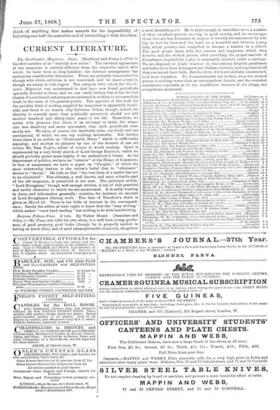CURRENT LITERATURE.
The Gentleman's Magazine. June. (Bradbury and Evans.)—This is the first number of an "entirely new series." The external appearance of the magazine is entirely different from the venerable aspect with which we have been so long familiar ; the internal arrangement has xmdergone considerable alterations. There are probably reasons for this change with which criticism is not concerned, and we must accept it, though we accept it with regret. The subjects with which the Gentle- man's Magazine was accustomed to deal have now found periodicals specially devoted to them, and we can easily believe that it has its best chance of a continued and prosperous existence in seeking to accommodate itself to the taste of the general public. The appetite of this body for the peculiar kind of reading supplied by magazines is apparently insati- able, and there is no reason why Sylvanus Urban, though, indeed, his identity is scarcely more than nominally preserved, should not add another hundred and thirty-eight years to his life. Meanwhile, we -notice with pleasure that there is an :attempt to make the maga- zine less desultory and more systematic than such periodicals com- monly are. We have, of course, the inevitable tales, one lively and one sentimental, of which we can say nothing favourable. But besides these there is an article on "Fashionable Music" which is sufficiently amusing ; and another on pictures by one of the keenest of our art critics, Mr. Tern Taylor, which of course is worth reading. Sport is represented by a very lively sketch of Lord George Bentinck, which we should probably praise more highly, if we understood it better. In the department of politics, we have an "interior" of the House of Commons; in that of amusement, we have a paper on "Croquet," of which the most noteworthy feature is the writer's belief that to "eliminate" means to " devise." He tells ns that "the beat form of a mallet has yet to be eliminated." The obituary, a well known and most valuable part of the old magazine, is preserved in the new. The principal article, " Lord Brougham," though well enough written, is not of that practical and useful character to which we are accustomed. It is sadly wanting in dates, and information generally; contains, for instance, no account of Lord Brougham's literary work. The date of Theodore's death is given as March 13. There is but little of interest in the correspond- ence. Surely the editor at least ought to know that the "easy writing" which makes "curet hard reading" has nothing to do with handwriting.






























 Previous page
Previous page